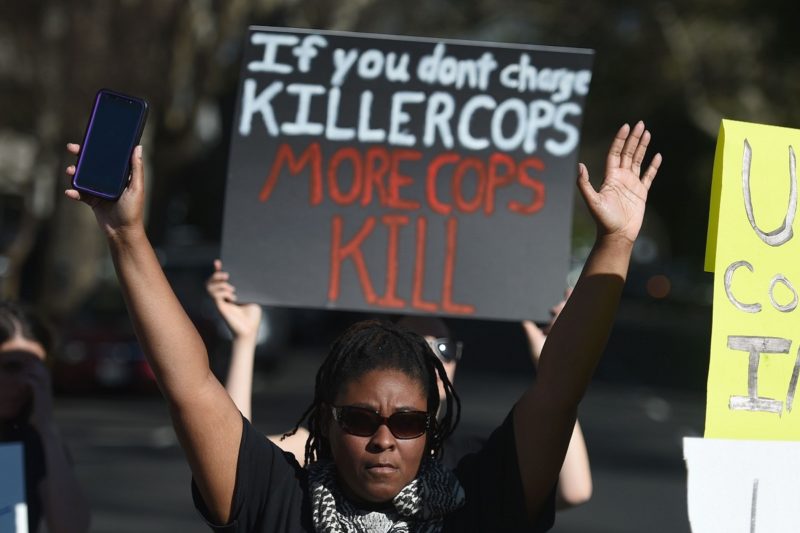In Passing ‘Blue Lives Matter’ Bill, House Lawmakers Ignore Civil Rights Leaders
Civil rights groups believe that the U.S. Senate version of the bill, which establishes crimes against law enforcement as hate crimes, is significantly worse.

Last week, a coalition of 28 civil rights and faith-based organizations including the American Civil Liberties Union (ACLU), the NAACP, and the Southern Poverty Law Center, co-authored a letter asking members of the U.S. House of Representatives to vote no on HR 5698, the “Protect and Serve Act of 2018.” But lawmakers, including Democrats, overwhelmingly voted to pass the legislation the next day.
The bill would establish offenses that target law enforcement officers as a federal crime, imposing penalties that are leading many of its opponents to label it the country’s first national “Blue Lives Matter” bill. Named for the push to “counter” Black Lives Matter, at least 32 of these bills were proposed in state legislatures last year, all intending to increase the penalties against those who harm officers.
“This bill is being contemplated at a time when our country is in the throes of a national policing crisis, with a never-ending stream of police shootings of unarmed African Americans captured on video,” the coalition wrote in a letter to Congress.
At least 987 people—disproportionately people of color—were shot and killed by police in 2017 and 963 in 2016, according to analysis from the Washington Post.
“Creating a new, yet superfluous, crime for offenses committed against law enforcement is a particularly disconnected and non-responsive policy choice,” the letter continued.
Still, 382 members of the House—including 162 Democrats—ignored the request and passed HR 5698. Members across the political spectrum voted yes, from House Minority Leader Nancy Pelosi (D-CA) to Progressive Caucus member and Democratic National Committee Deputy Chair Keith Ellison (D-MN) to Republican Rep. Darrell Issa (CA). Only 35 members voted against the measure.
Though the overwhelming majority of the House voted for the bill, only a handful released public statements about it.
Ranking member of the House Judiciary Committee Jerrold Nadler (D-NY) gave a speech in early May during the bill’s markup explaining problems with it, though he promised he would “not oppose it.” Nadler said that “the existing legal framework for prosecuting those crimes [against police officers] is more than adequate at both the state and federal level” and “it is not clear why this bill is needed at all.” Then he voted for the bill anyway.
When asked by Rewire.News, a spokesperson for Nadler’s office did not directly address why the congressperson voted for the bill despite voicing his reservations about the legislation.
One of the few members to critique and vote against the bill was Rep. Bobby Scott (D-VA). “The evidence shows that violence against law enforcement has been in overall decline for 25 years, and I want that decline to continue,” Scott said in a statement. “What has changed in recent years is a rising demand by citizens for police accountability. The appropriate response to strained police-community relations is not to criminalize what is already a crime.”
Congressional analysis of HR 5698 claims that police officers are facing “increasing levels of hostility and violence, fueled by growing anti-police sentiment.” Citing the number of police officers—64—who died in the line of duty in 2017, the report claimed that harsher penalties will solve this.
But violence against police officers has actually been decreasing since at least the 1970s. While the number of officers killed in the line of duty has risen in some recent years, “the rise was partly fueled by a few high-profile shootings that took the lives of multiple officers,” according to NPR. In the 1970s, the number of police deaths each year was significantly higher, averaging around 231.
All states currently have laws that increase penalties for law enforcement officers.
Civil rights groups believe that the U.S. Senate version of the bill, which was introduced on May 7 by Sen. Orrin Hatch (R-UT) and co-sponsored by Sen. Heidi Heitkamp (D-ND), is significantly worse because it establishes crimes against law enforcement as hate crimes.
“Not only does [the Senate’s bill] create a new crime by targeting law enforcement, it does it using the hate crimes framework,” Kanya A. Bennett, ACLU legislative counsel, told Rewire.News. “We know that law enforcement is already the most protected class of people given the federal laws that protect them [and] given the state laws that protect them.”
Civil rights advocates are gravely concerned that the bill will not only pass the Senate but will be signed by President Trump in the coming months.
Trump during his run for president said he would mandate the death penalty for those convicted of killing a police officer. While he has not followed through on that promise, Trump signed an executive order last year instructing the U.S. Department of Justice to pursue changes in legislation to define new penalties for federal crimes in order to prevent violence against law enforcement officers.
“We have a law and order administration. What we didn’t anticipate is having a law and order congress that is going to advance a policy agenda with no questions asked,” Bennett said. “The fact that you have members of Congress taking to the floor to talk about why this is a bad bill and then go and go vote on it …. It’s disturbing.”
